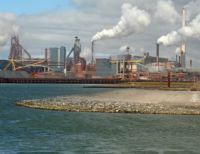

On 26 October 2022, the European Commission produced a proposal for stricter rules on ambient air, surface and groundwater pollution, as well as, to implement extra measures to improve the treatment of urban wastewater.
As part of the European Green Deal reforms, the Commission plans to tighten standards on the most dangerous water and air pollutants, including drastically reducing fine particulate matter (PM2.5) presence in the air and increasing control of hazardous substances in water, including PFAs, known as "forever chemicals", Bisphenol-A (BPA) and other toxic or harmful substances, like pesticides and antibiotics.
The Commission is proposing to revise the Ambient Air Quality Directives which will aim to set 2030 interim air quality standards that are aligned with the World Health Organisation guidelines, and to put the EU on target to achieve 2050 zero air pollution. A new scheme of compensation for poor health due to violation of EU air quality rules is sought to be introduced, where appropriate access to justice, effective penalties and improved information will be provided to the public.
It was found that 92% of toxic micro-pollutants found in EU wastewater systems originate from the manufacture of pharmaceuticals and cosmetics. The Commission proposes to amend the legislation to implement Extended Producer Responsibility to require producers to pay for the cost of removing those pollutants from the wastewater system. The proposal also aims to increase the value of wastewater as an energy source, for example from anaerobic digestion, where Member States will be required to track industrial pollution at the source to increase the possibility to reuse sludge and wastewater and prevent it from releasing pollution into the environment as well as reduce the release of greenhouse gases.
Additionally, standards for 16 pollutants already covered by emission limits, including heavy metals and industrial chemicals, will be most likely tightened and pollutants that are considered to be no longer an EU-wide threat will be removed.
The Executive Vice President for the European Green Deal, Frans Timmermans, said:
"Our health depends on our environment. An unhealthy environment has direct and costly consequences for our health. Each year, hundreds of thousands Europeans die prematurely and many more suffer from heart and lung diseases or pollution-induced cancers. The longer we wait to reduce this pollution, the higher the costs to society. By 2050, we want our environment to be free of harmful pollutants. That means we need to step up action today. Our proposals to further reduce water and air pollution are a crucial piece of that puzzle."
However, some critics say that those proposals are too weak and lack appropriate action to address the health and environmental impacts of the pollution. Bas Eickhout, a Green MEP and vice-chair of the European Parliament’s environment committee, said:
"While both the WHO and the European Environment Agency are ringing the alarm bells for health, the Commission is proposing lax air quality standards that are far below what is considered healthy. The Commission's failure to act on air pollution undermines the green deal and is a concession to corporations and countries pushing for weaker environmental targets".
This suggests that the revision could lead to relaxed emissions rules for new vehicles.
For more information on this subject, see: